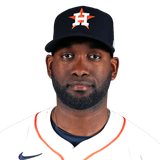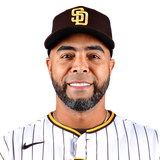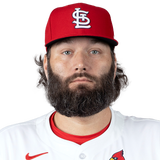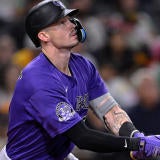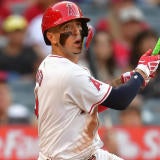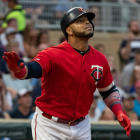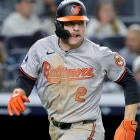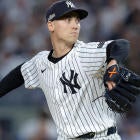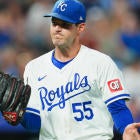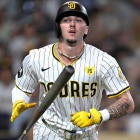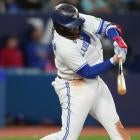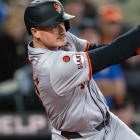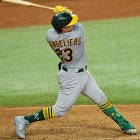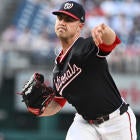Fantasy Baseball analysis has gotten pretty sophisticated over the years, particularly with the more recent introduction of Statcast data. Its role in clarifying some of the inferences made during the sabermetrics era has left little room to disagree over what makes for a good or bad player anymore.
Instead, it's a question of believability. Sure, these numbers are supported by those other numbers, but can we trust in those other numbers? And opinions diverge along the lines of track record, anecdotal evidence and intuition — you know, the same tools that used to guide us back when ERA was considered a cutting-edge stat.
Granted, we haven't come totally full circle. We're not flying as blindly as we did then. The disagreements surround a smaller group of players, but the form that those disagreements has taken is fascinating. As best I can tell, the closest thing to a market inefficiency in these days of justified groupthink is the surprising mid-career breakout. As in: "Yes, this player had a huge year, and yes, the data supports it, but ... come on. We know better than to believe it, right?"
It's disbelief for disbelief's sake — an attitude fashioned by more primitive tools like track record and intuition. And judging by ADP, it's a pretty universal one.
The justification for passing over these players, at least to the extent it's happening, is too flimsy for me to join in. I'll downgrade them to a degree, but not to the degree the majority seem to, and because of that, this list of underdrafted players is largely populated by last year's surprising mid-career breakouts. They aren't my sleeper or breakout picks for 2020 — I have separate columns for those — but they are some of the players I find myself drafting most often just because the price is right.
Of course, not all of these underdrafted players are the kind everyone else is scared of. In fact, the first up is universally regarded as a Fantasy stud.
You may have heard that stolen bases and high-end starting pitchers are all that matter anymore -- at least in standard 5x5 Rotisserie leagues, which is all FantasyPros ADP accounts for. It might make sense for Turner to slide to the second round in a points league, where stolen base contributions are just part of a larger point pool and not a vital part of an essential balance, but in 5x5 leagues, I've found that the head start he gives you in the scarcest of categories is too valuable to pass up after the five big outfielders have gone off the board. Most of the viable base-stealers who also contribute in other ways will be gone within the first 2-3 rounds, and Turner is liable to contribute twice as many steals as any of them. However he falls short in home runs and RBI won't be as difficult to make up for later, not in a power-laden environment where sluggers are scattered throughout the draft.
| |||||||
Whether it's because of the suspicion surrounding the Astros or second-year players more generally, Alvarez is being targeted like just another good hitter instead of the world beater he was a year ago, when his 4.00 Head-to-Head points per game ranked eighth among all hitters. Law of averages would tell you he overachieved some, but the way he impacted the ball still put his expected stats closer to the Mike Trout range than the Javier Baez range, where he tends to go. And for goodness' sake, he had 50 homers and 42 doubles between the majors and minors last year, his pace holding fairly steady between the two stops. It's the sort of bat worth paying up for at a time when speedsters are getting all the love, and while Alvarez's DH-only status may limit your choices in the later rounds, the potential impact more than justifies it.
| |||||||
Marte is the first of the aforementioned "surprising mid-career breakouts" on this list, but perhaps the breakout shouldn't have been so surprising given that he hit .285 with 13 homers and an .877 over the final four months of 2018. Still, he took it to another level with a .919 OPS in the first half of 2019 ... and then took it to yet another level with a 1.081 OPS in the second half. As soon as you were convinced the regression was coming, he'd unveil some new talent that forced you to reconsider his baseline, and the end result was far and away the best production among second basemen. Sure, his expected numbers didn't quite live up to his actual ones -- because how could they? -- but waiting until Round 3 to take him would be cautious enough. He goes in Round 4.
| |||||||
LeMahieu was the 19th-best hitter in standard 5x5 leagues last year, also ranking 21st in Head-to-Head points per game, and is eligible at three positions, including the weakest of all (disregarding catcher, of course), second base. He's projected to bat leadoff for the most star-studded lineup in baseball and has proven to be one of the most reliable sources of batting average over the years. But it just doesn't make sense that a guy in his 30s would put up career-best power numbers the year after leaving Coors Field, does it? And yet the way he impacted the ball totally backs up what he did, as evidenced by the .322 xBA and .529 xSLG. Frankly, with where he's going, it's almost irrelevant what the power production is. His contributions in batting average and runs would more or less justify it. I've actually had to move him down in my rankings a bit, seeing how late he goes, just to ensure I don't reach for him.
| |||||||
Cruz's case is a little like Yordan Alvarez's in that he's DH-only. But we're still talking a four-round difference between Alvarez and Cruz -- and I already said Alvarez is a value. The difference, of course, is age. The few hitters who make it to 39 are barely clinging to a roster spot, unwilling to admit that the game has passed them by. They're not coming off the healthiest and most productive six-year stretch of their career -- one in which Cruz's average numbers are a .285 batting average, 41 homers, 105 RBI and 86 runs. Sure, it could end abruptly this year, with the bottom falling out. Father Time is undefeated, after all. But to presume it leaves an enormous amount of production on the table in Round 7.
| |||||||
Josh Bell ranked sixth among first basemen in 5x5 leagues last year and had the 22nd-most points per game among all hitters in Head-to-Head. So why is this super stud being drafted alongside the likes of Tommy Pham and Eddie Rosario? Well, the difference in his first- and second- half splits was pretty drastic, with the latter leaving a bad taste in everyone's mouth, but the full-season numbers were still supported by the data, with his xBA and xSLG aligning with his actual contributions. Changes to his batted-ball profile, bolstered by his already impressive plate discipline, still point to a high ceiling, and he has explained away his struggles by saying he was overly concerned with timing up breaking balls, making him late on fastballs. He still hit eight home runs in August, so the reaction seems a little much.
| |||||||
Here we have yet another player coming off an MVP-caliber season that no one is prepared to believe. The slide for Marcus Semien, who was the No. 18 hitter in 5x5 scoring and No. 21 in points per game last season, is especially egregious, and what's most stunning about it is that his transformation might be the most believable of all. The changes to his profile were wholesale, from the greatly improved strikeout and walk rates at the start of the year to the reduction in ground balls in the second half, when he really took off with a .304 batting average, 19 homers and 1.018 OPS. As has been the refrain with these mid-career breakouts, the expected stats back up the actual ones, so if Semien overachieved, it was because of a temporary rise in skill level and not anything luck-related. And maybe that's all it was, but the potential impact late in Round 7 could make him a league-winner again.
| |||||||
Just taking his numbers at face value, Soler is obviously going later than he should. His 48 home runs were third in the majors. His 117 RBI were tied for seventh. His average exit velocity and hard-hit rate both ranked among the top 12, thereby confirming an elite power profile. But then when you factor in his improvements in the second half, when he cut down his strikeout rate to a Kris Bryant-like 23 percent while putting the ball on the ground less than ever, suddenly he profiles a lot like Giancarlo Stanton -- not today's Stanton, but the one who won NL MVP in 2017. If those gains hold and Soler has arrived at a place where batting average is more likely a strength than a weakness, the sky's the limit. I see more upside than downside at his going rate.
| |||||||
It's difficult to find an underrated starting pitcher in today's drafting landscape, where a dearth of dependable arms has made for an early-round frenzy, but there may be some disagreement as to where that range of dependable arms ends. To me, Montas is on the right side of it. His breakthrough season may have spanned only 16 starts, 15 of which came before an 80-game PED suspension, but it was built through the introduction of a new pitch, a splitter that completely revolutionized his arsenal. When hitters made contact with it, they put it on the ground, but they didn't make contact often. Limiting both contact and fly balls is the best formula for success in today's homer-saturated league, and fittingly, Montas' 3.47 xFIP would have ranked in the top 12, between Yu Darvish and Luis Castillo, if he had enough innings to qualify.
| |||||||
How good was Kepler in 2019? His 3.55 Head-to-Head points per game ranked just behind Pete Alonso and ahead of Bryce Harper, Austin Meadows, Kris Bryant and Aaron Judge. Maybe that's not the fairest number to cite given that the ADP in question is for 5x5 leagues, which don't reward his low strikeout rate like points leagues do, but I wanted to give you a sense of just how big a deal he was 2019. This isn't some Oscar Mercado or Cavan Biggio merely finding his way, yet those are two of the players Kepler is getting drafted in between. I understand there's a skills scarcity in play there and that Kepler's two weakest 5x5 categories, batting average and stolen bases, are the ones in highest demand, but seeing a player who's so productive in the other three still available in this range should be all the more incentive for you to fill those scarcer categories early.
| |||||||
Lynn, like Montas, was a pitcher breakthrough no one saw coming in 2018, and because it happened at age 32, the doubt applies double for him. But if you're in the hole at starting pitcher by the point he's going off the board, your best best bet is to just trust in him doing it again. It's a more likely outcome than you finding success by piecing together a bunch of flawed options in today's hostile pitching environment. To give you an idea just how productive he was last year, Lynn ranked seventh in both innings and strikeouts, which are the clearest indicators of an ace-caliber pitcher, and if you reduce his numbers to just his final 26 starts, after he had settled on a new method of attack, he had a 3.17 ERA, 1.13 WHIP and 11.3 K/9. What was that method? More cutters, which seemed to play off his fastball better than his sinker did, elevating the whiff rate on both.
| |||||||
You have to pay up for stolen bases. It's just a reality of Fantasy in 2020. So how is a presumptive 20-20 man (or that sort of pace, anyway) like Kingery going as late as he goes? The last one to go before him, Danny Santana, goes 47 picks earlier. The next to go after him is ... well, he probably doesn't exist. Yup, Kingery is the last significant base-stealer who won't sink you in the home run category. He's already dual-eligible, with a chance of picking up second base in the near future, and is expected to play even more than last year with Maikel Franco and Cesar Hernandez out of the picture. He seems like the sort of pick everyone should be going for.
|
So which sleepers should you snatch in your draft? And which undervalued first baseman can help you win a championship? Visit SportsLine now to get rankings for every single position, all from the model that called Kenta Maeda's huge breakout last season, and find out.





